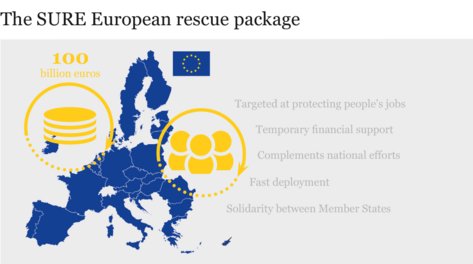 ©Song_about_summer - stock.adobe.com
©Song_about_summer - stock.adobe.com
The COVID-19 crisis from the perspective of
the self-employed
Intro
ed* Nr. 02/2020 – Chapter 3
The starting position of those, who are self-employed is vastly different to that of employees in terms of their social security. While most employees are protected against loss of earnings by social insurance and other social security schemes, this is generally not the case for the self-employed.
The Member States are making enormous financial efforts to prevent unemployment. To some extent, this is done through grants to companies with the aim of maintaining business operations, above all, by activating and reinforcing instruments such as the short-time working grant.
Such instruments are of little use to many “atypical” employees, particularly the self-employed. In particular, in systems that compensate for unexpected and temporary losses of income, no, or very little, security is provided for them in many cases. They are usually not eligible for the short-time working grant.
Measures and policy recommendations
Therefore, it is logical for SURE to expressly include protection for the self-employed to reduce unemployment and loss of income.
The measures taken at Member State level reveal certain structures in the social security for the self-employed against the risk of sudden loss of income. While the self-employed already had access to some form of unemployment insurance before COVID-19, the conditions for accessing those benefits have been relaxed, benefits have been extended (Italy, Spain) and additional benefits have even been introduced, such as in Luxembourg, Switzerland, Slovakia, Slovenia, the Czech Republic and Poland.

In France and Belgium, even before the coronavirus crisis, the self-employed received a kind of ‘unemployment benefit’ in case of insolvency. This can be claimed even now for COVID-19-related discontinuance of business operations in certain circumstances. In Belgium, however, social security contributions must have been paid beforehand. In addition, there are regional government aid programmes, which, among other things, also provide grants to self-employed people, who have had to close down their businesses.2 France maintains a seven billion euro solidarity fund to support small businesses.3
In countries, where the self-employed were not protected by unemployment insurance before COVID-19, the rules applicable to employees were generally not simply adopted.4 In some countries, a – usually low – lump sum payment is made.5 Other countries compensate for the loss of turnover or income but only up to a certain limit.6 Occasionally, the self-employed are also eligible for a state refund of social security contributions as in Estonia and Greece, or even a (partial) suspension of payment as in the Czech Republic.
The situation is difficult for the self-employed, who have worked informally, as in most cases proof of income prior to the outbreak of COVID-19 is required in order to benefit from the support.7 In some cases, prior registration of the activity is required.8 Or the payment is linked to the condition of membership of the social security scheme.9
Targeted additional measures to protect the self-employed against loss of income due to illness is difficult to find during the COVID-19 crisis. That would have been reason enough to “improve” – if only to prevent the self-employed from continuing to work in spite of COVID-19 symptoms. In many cases, there is only inadequate cover, or no cover at all. Only 15 of the 27 Member States of the EU have made access to sick pay compulsory.10 With regard to the loss of income due to illness of self-employed persons with care obligations, the European Foundation for the Improvement of Living and Working Conditions (Eurofound) states that newly introduced or adapted support systems have been extended to cover groups of people not previously protected, such as the self-employed.11

‘Lessons learnt’?
Back in the financial crisis of 2008, almost all Member States introduced some form of ‘short-time working grant’ to avoid a massive loss of jobs. In this respect, ‘lessons have been learned’. Where Member States have failed to make their national budgets more resilient during the recovery, and now lack sufficient funds to fully implement labour market policy support measures such as short-time work, the SURE 100 billion euro European rescue package can help. However, it is debt-financed, so ultimately not a blueprint for the future.
Social security of the self-employed is fragmentary. Therefore, they have been included in the various support packages but often at a much lower level than employees.
In terms of the future, the question arises whether the Member States will continue to protect the self-employed after the crisis and whether they will standardise the benefit components that were initially introduced on a temporary basis and transfer them to the social security system. The prospects for this seem rather bleak. The Member States consider their support as temporary aid. There is another reason for doubt about the continuation of aid after the crisis: The programmes are debt-financed, thus unsustainable.

